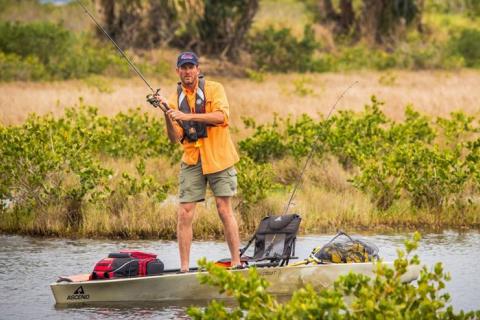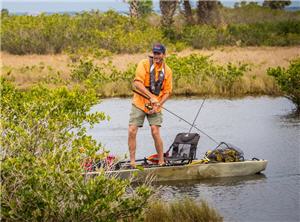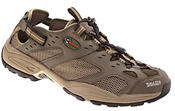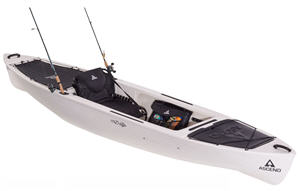
Stability and the ability to stand while fishing are highly sought after capabilities for anglers looking to purchase a kayak.
As people flock to the sport they see commercials, ads, pictures and videos of people standing up and fishing from a variety of kayaks. I've seen almost every major manufacturer release an ad for one of their kayaks where someone is standing up and fishing. It's a major sales draw. If a company doesn't have a kayak that they sell for standing and fishing they are behind the times.
 These pictures and videos however can be misleading. The design of the kayak, its hull, its width and the water conditions all play into stability so that a fisherman can stand. Not enough people, especially those shopping for a "stand and fish" kayak, are looking at the biggest variable: the fisherman.
These pictures and videos however can be misleading. The design of the kayak, its hull, its width and the water conditions all play into stability so that a fisherman can stand. Not enough people, especially those shopping for a "stand and fish" kayak, are looking at the biggest variable: the fisherman.
![]() Extra Tip: The first time venturing out in a new (or new to you) kayak, take very little extra gear just in case you do flip.
Extra Tip: The first time venturing out in a new (or new to you) kayak, take very little extra gear just in case you do flip.
Fishermen are all built differently. People also have different levels of balance. Even if I can stand and fish on most kayaks made doesn't mean you can.
I've seen a 41 inch wide kayak flip and it wasn't in the ocean at the time. It was on a calm day on a small lake. It's about the fisherman AND the kayak.
Things to Consider
If you are standing on a sit on top kayak, you have to balance from your ankles up. That is a lot of core balance for a lot of people. If you are big in the shoulders or big in the belly, this is going to prove more difficult. Slight framed folks and shorter folks will generally have an easier time with this.
Think about balancing a broom handle, vertically on your palm. It's difficult, right? Add a tennis ball to the middle of the broom handle or to the top and it becomes more difficult. Weight across your body that is not evenly distributed (beer gut) will be more difficult to keep in balance when the balance point is further away.
 |
| World Wide Sportsman River Rat Water Shoes |
![]() Extra Tip: Find good water shoes like the customer top rated and best seller, World Wide Sportsman River Rat water shoes or boots to wear in a kayak to protect your feet from hooks and sharp fins or teeth.
Extra Tip: Find good water shoes like the customer top rated and best seller, World Wide Sportsman River Rat water shoes or boots to wear in a kayak to protect your feet from hooks and sharp fins or teeth.
Making it Easier to Stand in a Kayak
Having a wider platform to stand on makes this easier. It is easier to balance when your feet are able to be shoulder width apart and slightly more. Most adults have a shoulder width wider than 20" so a deck that only allows 20" with a total kayak width of 28" will be more difficult to balance on. As the width of the total kayak gets wider, even if the deck isn't as wide it will become easier to balance. The ideal situation is a wide deck and a wide kayak. Finding a 28"+ wide deck with a 32" or larger total width will help.
Also consider the seat. More people that I have seen turtle have done so when getting into or out of the seat. A seat that is up off the deck will be easier to gain your balance. Is it easier to stand up from the floor or from a chair? The chair, right? Keep this in mind when shopping. Even a couple of inches gained is a big change.
![]() Extra Tip: Total width of a kayak is the span from the outer most walls on both sides of the seat.
Extra Tip: Total width of a kayak is the span from the outer most walls on both sides of the seat.
 |
| H12 from Ascend is a hybrid kayak |
What If I Have Bad Balance?
The problem with kayaks is in most circumstances as they get wider, they get slower and more sluggish to paddle (the obvious exceptions are pedal and motorized kayaks). This is where hybrid kayaks come in. The H12 from Ascend is a hybrid kayak that is part sit in and part sit on. It looks more like a canoe than a kayak to some (though the hull design is different). When you stand in one of these kayaks you have a sidewall to brace your leg against. This raises the balance point from your ankle to almost your knee. It's almost as if you've made yourself shorter. The amount of body you now have to balance is lessened and the 32" wide H12 offers more stability to most people than a 33" wide sit on top.
Final Verdict
Now that you are either confused, angry or nodding your head in agreement, let me offer a suggestion. If you want to stand and fish out of the kayak you are shopping for, stop looking at marketing material. Find a demo day near you or a get together friends or Boondoggle and go try to do this yourself. Find out how hard or easy it is to stand in all of the models you are looking at.
Demo. Demo. Demo. If you absolutely can't do that and you have to shop online by specs and videos only, look at total width and width of the cockpit. The bigger they are the more stable. Is it a guarantee that you can stand? No. Will it be more likely? Yes.
It will almost always be easier to stand in a kayak that is 40" wide than one that is 20" wide. Just keep in mind the balance points discussed and demo if at all possible then you should be good to go.
- 11568 views

